
This year, Egypt welcomed the largest foreign investment in history, with a $35 billion investment from the United Arab Emirates paving the way for Egypt's reform. Despite receiving such large-scale financial support, Egypt's economic crisis has not yet been resolved, and even before the escalation of the war in the Gaza Strip, it faced long-term foreign exchange shortages and soaring inflation. Experts have warned that Egypt's economic difficulties are far from over.
Firstly, this investment comes from ADQ, the third largest sovereign wealth fund in the United Arab Emirates, for investing billions of dollars in real estate projects along the Mediterranean coast of Egypt. Many analysts point out that this investment provides Egypt with the necessary foreign exchange reserve buffer to support the implementation of expensive economic reform plans, which are expected to receive billions of dollars in support from international lending institutions.
As for Egypt's economic reform, over the past few years, Egypt has been working hard to support the value of its currency, the Egyptian pound, in order to reduce economic fluctuations. As a result, Egypt had to deplete its foreign exchange reserves and purchase pounds at prices higher than market prices in the global market. This resulted in the value of the pound being higher than without government intervention, thereby increasing the purchasing power of the Egyptian people. However, this also means that Egypt's economy is increasingly reliant on imported goods such as oil and wheat, leading to a decrease in foreign exchange reserves.
Moreover, this reform coincides with one of the most severe economic crises in modern Egyptian history. Since 2013, Egyptian President Abdul Fatah al Sisi has invested billions of dollars in large-scale projects, including the construction of a new capital. These expenditures have increased Egypt's debt from 70% of its GDP in 2010 to 96% in 2023. Due to Egypt's heavy reliance on imported wheat, the Russia Ukraine war has exacerbated inflation, and since 2010, approximately 10 million Egyptians have fallen into poverty.
In addition, the military's dominant position in the economy remains the main factor determining the success of reforms, especially in the development of the private sector in Egypt. The military does not pay taxes and has hundreds of businesses, including factories, gas stations, retail stores, tourism companies, and real estate developers. This level of state intervention excludes the private sector, which cannot compete with the military's government balance sheet or its ability to bypass government regulation. Therefore, weakening its position in the economy without weakening the military's economic strength will be a challenge.
It is undeniable that Egypt's dependence on remittance income, tourism, and trade costs through the Suez Canal makes its economy particularly vulnerable to external shocks. The war between Israel and Egypt has brought further pressure to Egypt's already struggling economy. The tourism industry accounted for 15% of Egypt's GDP in 2018, but experienced a decline after the Hamas attack on Israel on October 7, 2023. Economists predict that tourism revenue will decrease by 10% to 30% this year, thereby reducing Egypt's foreign exchange supply. However, Egyptian officials have stated that despite some impact, the tourism industry is still close to its highest level in history. At the same time, the operating costs of the Suez Canal brought $10 billion to Egypt in 2022-23, but the operating costs of the canal were halved after major shippers chose longer routes to bypass the Horn of Africa due to armed attacks in the Red Sea.
In summary, the economic crisis in Egypt is closely related to political stability. Despite the people's urgent desire for reform, the future is still full of uncertainty amidst the lack of political diversity and the continuous expansion of the military. To solve this dilemma, it is necessary to reduce military intervention in politics and economy, and achieve an independent and autonomous economic development model. However, under realistic conditions, this change is difficult to achieve. Therefore, only through political and economic reforms by Egypt itself can it overcome its difficulties.

報告顯示,中國電力投資加速增長,預計2024年電網基建投資將超過5300億元。
近日,市場迎來了一則引人注目的消息:工業巨頭3M公司(MMM.N)在本周五公布了其季度業績報告,隨後股價飆升至近兩年來的
最近,外媒給OpenAI算了筆賬,今年可能要血虧50億美元。
近日,巴黎奧運會和世界鐵人三項協會聯合發布了一項重大決定,宣布因塞納河水質污染問題,原定於近期進行的奧運會鐵人三項首次下
當地時間7月18日,法國巴黎發生了一起令人震驚的持刀襲警事件。
近期,一則重大消息在國際舞臺上引起軒然大波,馬來西亞宣布加入金磚國家。
調查發現,互聯網和智能手機的使用幹擾了韓國近五分之一學生的生活。